I’m getting into my stride and cracking the repetition syndrome with more classes. I read stories and I use my props. The children’s attention to the stories is miraculous and I can feel learning crackling around me. They answer questions which have not appeared in their text book. But it’s not simple. I find it difficult to fathom what they understand.Their bonding to the text book is powerful; it seems to structure almost all of their interactions. They read well. Sometimes when I ask them questions I find they give me answers from the book, answers which are structurally correct but wrong. It’s a puzzle. Do they find my accent difficult to understand? They have never spoken to a native English speaker before and the English teachers’ spoken English is like a different language. The general tendency, as far as we can see, is to present the secondary children with texts that are far, far too advanced for them. There is no differentiated learning. At the secondary school I think there are about 3 or four children out of 40 who understand what they are reading, but miraculously they can still do the written exercises, exhibiting a very developed sense of pattern recognition. Clearly the children enjoy school and are very keen on activities whether or not they understand them. The communal rote responses requested carry the class along.
After a particularly delightful lesson using ‘The very hungry Caterpillar’ and a variety of toy food and plates I ask the teacher if she would like me to leave my story books and props behind when I go. She looks embarassed.
‘No, no t’ank. If we do different to book we will be fined by government.’
Oh dear. It transpires that there is a national curriculum par excellence. The same lesson has to be done every day by every child in the country from this very old fashioned textbook. I feel disheartened. As a foreigner I am allowed to deviate, but how useful is this? I discuss this with Phuong and he says that this attitude is not right; as long as you try and achieve the required learning you can devise your own way of teaching the lesson. But if hers is the prevailing attitude, it seems that is how it is. Teachers here get an equivalent of approximately 100 GBP a month. This wage is hardly an incentive to spend extra time planning lessons.
Having spent a week trying out different things I am now keen to team teach more with staff. It does not seem useful to do something which is entirely alien to their way of doing things, but rather to integrate what we do more. Planning together proves difficult. I get the impression that teachers are not used to planning. They are reliant on the text book. My intended co-teacher regularly wanders off mid conversation and it is very difficult to hear each other speak over the loud booming of the exercise drum. I think I might be seen as a rather dour overplanner.
We have been asked to team teach a special 11/2 hour voluntary lesson in the afternoon with children aged 11-15 who are considered to be more able but unable to afford the local selective school. The whole lesson is to be talking and listening. We are told 30 children but over 40 turn up. Peter and myself plan hard and keep it together. We don’t work together too badly and it’s great being able to review and replan together.
Peter has been asked to bring in his guitar today to contribute to a lesson which appears to be an inspection. Unusually, eight other teachers also attend this lesson. In the staffroom Peter is ecouraged to play Auld LangSyne (which appears in their textbook) and me to sing. We perform, me singing badly, in the blazing heat. The teachers cheer enthusiastically.
It appears that our permission for teaching has not been fully granted. We will not be teaching in a range of schools as planned, but from my point of view that is no bad thing. Two is quite enough to cope with. Phuong is edgy. The committee has been asking questions about us. It is so unusual for foreigners to visit this region.There is concern that we might be political activists. Phuong says that if we were taping our conversations it would be awkward. The openess with which we talk has made him feel vulnerable.


